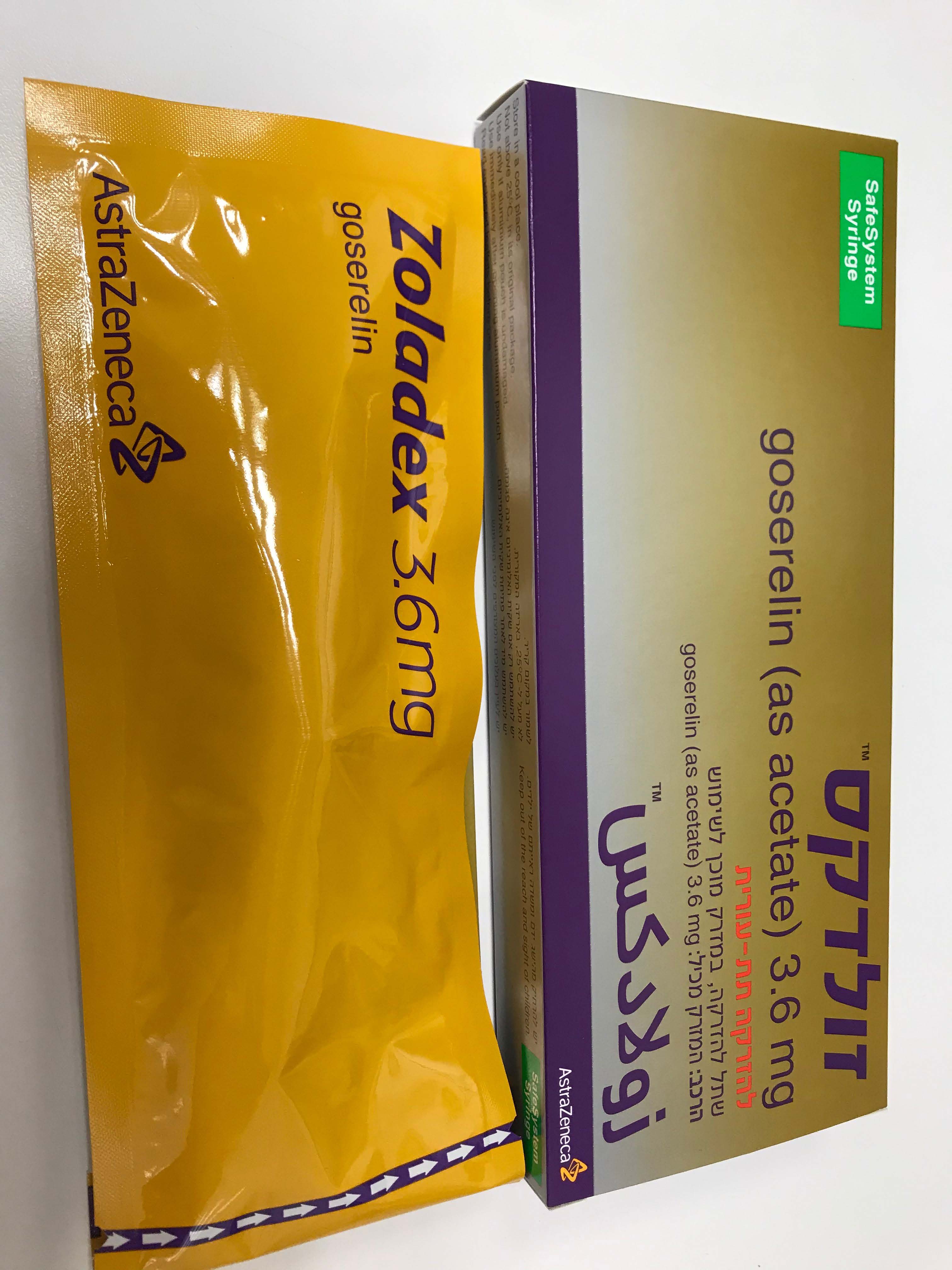Quest for the right Drug

זולדקס ZOLADEX (GOSERELIN AS ACETATE)
תרופה במרשם
תרופה בסל
נרקוטיקה
ציטוטוקסיקה
צורת מתן:
תת-עורי : S.C
צורת מינון:
שתל : IMPLANT
עלון לרופא
מינוניםPosology התוויות
Indications תופעות לוואי
Adverse reactions התוויות נגד
Contraindications אינטראקציות
Interactions מינון יתר
Overdose הריון/הנקה
Pregnancy & Lactation אוכלוסיות מיוחדות
Special populations תכונות פרמקולוגיות
Pharmacological properties מידע רוקחי
Pharmaceutical particulars אזהרת שימוש
Special Warning עלון לרופא
Physicians Leaflet
Adverse reactions : תופעות לוואי
4.8 Undesirable effects The following frequency categories for adverse drug reactions (ADRs) were calculated based on reports from ZOLADEX clinical trials and post-marketing sources. The most commonly observed adverse reactions include hot flushes, sweating and injection site reactions. The following convention has been used for classification of frequency: Very common (≥1/10), Common (≥1/100 to <1/10), Uncommon (≥1/1,000 to <1/100), Rare (≥1/10,000 to <1/1,000), Very rare (<1/10,000) and Not known (cannot be estimated from the available data). Page 7 of 15 Table 1 ZOLADEX 3.6 mg adverse drug reactions presented by MedDRA System Organ Class SOC Frequency Males Females Neoplasms benign, Very rare Pituitary tumour Pituitary tumour malignant and Not known N/A Degeneration of uterine unspecified (including fibroid cysts and polyps) Blood and lymphatic Not knownj Anaemia, Leucopenia Anaemia, Leucopenia system disorders and Thrombocytopenia and Thrombocytopenia Immune system Uncommon Drug hypersensitivity Drug hypersensitivity disorders Rare Anaphylactic reaction Anaphylactic reaction Endocrine disorders Very rare Pituitary haemorrhage Pituitary haemorrhage Metabolism and nutrition Common Glucose tolerance (see Not known) disorders impaireda Uncommon N/A Hypercalcaemia Not knownj (see common) Glucose tolerance impaired Psychiatric disorders Very common Libido decreasedb Libido decreasedb Common Mood changes, Mood changes, depression depression Very rare Psychotic disorder Psychotic disorder Nervous system Common Paraesthesia Paraesthesia disorders Spinal cord N/A compression N/A Headache Not known Memory impairment Memory impairment Cardiac disorders Common Cardiac failuref, N/A myocardial infarctionf Not known QT prolongation (see QT prolongation (see sections 4.4 and 4.5) sections 4.4 and 4.5) Vascular disorders Very common Hot flushb Hot flushb Common Blood pressure Blood pressure abnormalc abnormalc Page 8 of 15 Not known Pulmonary embolism Pulmonary embolism Hepatobiliary disorders Not knownj Hepatic dysfunction Hepatic dysfunction and and Jaundice Jaundice Skin and subcutaneous Very common Hyperhidrosisb Hyperhidrosisb, acnei tissue disorders Common Rashd Rashd, alopeciag Not Known Alopeciah (see Common) Musculoskeletal, Common Bone paine (see Not known) connective tissue and (see Uncommon) Arthralgia bone disorders Uncommon Arthralgia (see Common) Not knownj (see Common) Bone pain Respiratory, thoracic and Not knownj Interstitial lung disease Interstitial lung disease mediastinal disorders Renal and urinary Uncommon Ureteric obstruction N/A disorders Reproductive system and Very common Erectile dysfunction N/A breast disorders N/A Vulvovaginal dryness N/A Breast enlargement Common Gynaecomastia N/A Uncommon Breast tenderness N/A Rare N/A Ovarian cyst N/A Ovarian hyperstimulation syndrome (if concomitantly used with gonadotrophins) Not known N/A Withdrawal bleeding (see section 4.4) General disorders and Very common (see Common) Injection site reaction administration site Common Injection site reaction (see Very common) conditions N/A Tumour flare, tumour pain (on initiation of treatment) Not knownj Tumour flare (on (see common) initiation of treatment) Page 9 of 15 Investigations Common Bone density Bone density decreased decreased (see section (see section 4.4), weight 4.4), weight increased increased a A reduction in glucose tolerance has been observed in males receiving LHRH agonists. This may manifest as diabetes or loss of glycaemic control in those with pre-existing diabetes mellitus. b These are pharmacological effects which seldom require withdrawal of therapy. Hyperhidrosis and hot flushes may continue after stopping ZOLADEX. c These may manifest as hypotension or hypertension, have been occasionally observed in patients administered ZOLADEX. d These are generally mild, often regressing without discontinuation of therapy. e Initially, prostate cancer patients may experience a temporary increase in bone pain, which can be managed symptomatically. f Observed in a pharmaco-epidemiology study of LHRH agonists used in the treatment of prostate cancer. The risk appears to be increased when used in combination with anti- androgens. g Loss of head hair has been reported in females, including younger patients treated for benign conditions. This is usually mild but occasionally can be severe. h Particularly loss of body hair, an expected effect of lowered androgen levels. i In most cases acne was reported within one month after the start of ZOLADEX. j Frequency of the adverse drug reactions is based on spontaneous data. Description of selected adverse event Blood pressure abnormal: The changes are usually transient, resolving either during continued therapy or after cessation of therapy with Zoladex. Rarely, such changes have been sufficient to require medical intervention, including withdrawal of treatment from Zoladex. In addition, the following adverse drug reactions have been reported in women treated for benign gynaecological indications: Acne, change of body hairs, dry skin, weight gain, increase in serum cholesterol, ovarian hyperstimulation syndrome (if concomitantly used with gonadotropines), vaginitis, vaginal discharge, nervousness, sleep disorder, tiredness, peripheral oedema, myalgias, cramp in the calves, nausea, vomiting, diarrhoea, constipation, abdominal complaints, alterations of voice. Page 10 of 15 Reporting of suspected adverse reactions Reporting suspected adverse reactions after authorisation of the medicinal product is important. It allows continued monitoring of the benefit/risk balance of the medicinal product. Any suspected adverse events should be reported to the Ministry of Health according to the National Regulation by using an online form: https://sideeffects.health.gov.il

מסגרת הכללה בסל
התוויות הכלולות במסגרת הסל
| התוויה | תאריך הכללה | תחום קליני | Class Effect | מצב מחלה |
|---|---|---|---|---|
| Breast cancer for premenopausal women | אונקולוגיה | GOSERELIN, LEUPRORELIN |
שימוש לפי פנקס קופ''ח כללית 1994
לא צוין
תאריך הכללה מקורי בסל
01/01/1995
הגבלות
תרופה שאושרה לשימוש כללי בקופ'ח
מידע נוסף
עלון מידע לצרכן
10.03.22 - עלון לצרכן אנגלית 10.03.22 - עלון לצרכן עברית 10.03.22 - עלון לצרכן ערבית 03.10.22 - עלון לצרכן עברית 04.01.23 - עלון לצרכן אנגלית 04.01.23 - עלון לצרכן עברית 04.01.23 - עלון לצרכן ערבית 20.09.23 - עלון לצרכן עברית 09.01.24 - עלון לצרכן אנגלית 09.01.24 - עלון לצרכן ערבית 12.05.13 - החמרה לעלון 19.06.17 - החמרה לעלון 16.06.13 - החמרה לעלון 03.10.22 - החמרה לעלון 19.09.23 - החמרה לעלוןלתרופה במאגר משרד הבריאות
זולדקס